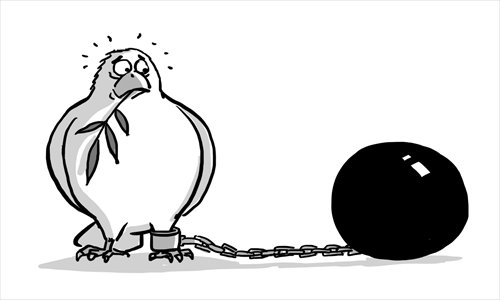China offers gradual steps to Mideast peace

President of the Palestinian Authority Mahmoud Abbas and Israeli Prime Minister Benjamin Netanyahu both visited China last week. Both sides have hopes that China can play a role in mediating the Palestine-Israel conflict.
Contention among the US, Israel and Palestine has made the peace talks quite difficult. Israel's policy toward Palestine has become more hard-line since Netanyahu took office. He refused US President Barack Obama's proposal to stop building Israeli settlements in the occupied territories. At the same time, the conditions, including demilitarization, that he has proposed for peace have been refused and viewed as an infringement of Palestine's sovereignty.
The US then urged Palestine to conduct talks with Israel directly, which also failed to gain support from Abbas. And Palestinians have been given new hope by the reconciliation between Hamas and Fatah and the granting of UN observer status to Palestine.
But the new UN status has also intensified the existing contradictions between Palestine and Israel. Israel has become wary of Palestine taking further substantial steps. Palestine is facing heavier pressure from the US and Israel and a serious financial crisis. These wider problems cannot be resolved by Palestine's own efforts. They require stronger support from the international community.
As the only important power outside the Quartet on the Middle East, which comprises the US, the EU, the UN, and Russia and serves as the main diplomatic body dealing with the Palestine-Israel issue, China has an important role in promoting the peace talks. That's also the important reason for the successive visits of the officials from Palestine and Israel.
Against the current background, the Palestine-Israel issue is a difficult issue for China. Nevertheless, China's efforts are not doomed to be ineffective.
China has always supported the foundation of Palestine state morally, diplomatically and economically. The establishment of diplomatic relations between China and Israel has provided China better opportunity to maintain friendship with both sides.
Calling for realizing real peace, promoting the foundation of a state of Palestine, maintaining fairness instead of favoritism and avoiding coercive measures have always been China's main stance on this issue. They will also be the basic preconditions for China's mediation.
China should persuade Israel to compromise with Palestine. After the Six Day War in 1967, when Israel recaptured Jerusalem, a site of great political and religious significance, Israel became powerful enough both psychologically and militarily to safeguard its national independence and sovereignty. The key problem became normalizing Israel's status as a country.
Unfortunately, the uncompromising policies toward the Palestinians have continued to dominate the Israeli mainstream. Israel has to learn compromise and make concessions. Compromising does not mean surrender or cowardice. Compromise by the strong brings respect, which will bring Israel a more long-lasting peace.
Precisely for this reason, China should use various means to persuade Israel to make concessions. If Israel understands that compromise also meets its own interests, the peace process will be no longer just an extravagant hope.
It is also very important to provide economic assistance to Palestine. Currently, both the US and Israel ignore Palestine's financial difficulties, hoping to force Palestine back to the track that the US and Israel expect.
However, pressures are no help to resolving the problem. China should discuss with relevant countries, including the US, on how to seek common interests between Palestine and Israel, looking to let Palestine be accepted by the US and international society and create a better international environment for peace talks.
China also needs to provide appropriate economic assistance to Palestine to ease current financial difficulties and the humanitarian crisis.
Moreover, China's active coordination with the Quartet is also indispensable. China has to fully realize the obstacles to the resolution the Palestine-Israel issue and the power struggles behind these difficulties.
This long-existing problem cannot be resolved easily by China's own efforts. What China should do is to urge the Quartet to exert its influence and act in concert with it at the periphery.
Meanwhile, China must also urge both sides to remain restrained and conduct direct negotiations with pragmatic attitudes.
The solution of practical problems, such as the Israeli settlements and the transfer of taxes, can resolve the issue step by step and eventually lead to breakthroughs.
The author is an associate professor of the Institute of International Relations at Shanghai Academy of Social Sciences. opinion@globaltimes.com.cn